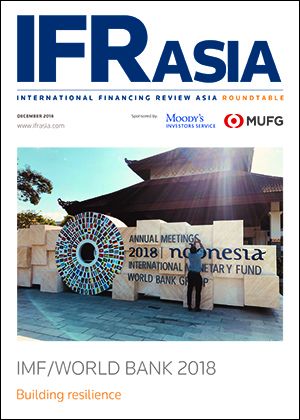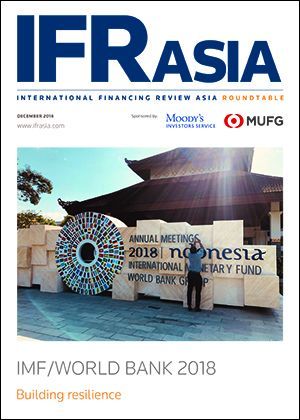Delegates at the IMF’s annual meetings in Bali got an uncomfortable reminder of Asia’s vulnerability to unforeseen shocks with an earthquake in the small hours of October 11. The financial markets have been doing their part, too.
The recent slump in emerging market currencies and intensifying US-China trade war provided a cloudy backdrop for IFR’s second appearance on the IMF’s official agenda. With rising oil prices, slumping emerging market currencies and a worsening US-China trade war all high on the agenda, IFR gathered a panel of expert speakers to discuss the progress made and challenges ahead for Asia’s capital markets.
While the region’s markets have come a long way since 1997, the recent shift in global portfolio flows is proving especially painful for countries with a high current account deficit – in other words, emerging markets that are investing in the future.
Local capital markets offer an essential source of funding for Asia’s growth, and the panel was quick to highlight the importance of deepening regional savings pools. As more savings find their way into bonds – through insurance, pension plans and mutual funds – the availability of long-term finance will also increase.
That bodes well for Asian infrastructure, which needs considerable investment to keep pace with the region’s economic growth. Initiatives such as offshore rupiah Komodo bonds, used by Indonesian issuers to help finance roads and bridges without adding to foreign exchange risk, add to the range of funding options available.
The panel offered reasons to support markets such as India and Indonesia in the face of a rising US dollar, praising central banks for prioritising stability over growth and being quick to raise rates to shore up confidence.
Discussions centred on the rationale for free and open markets, and the important role of both local and global institutional investors in supporting Asia’s development.
Since the seminar, confidence has returned to Asia’s local markets, with the Indonesian rupiah rallying more than 4% against the dollar in the first half of November. The Indian rupee, too, has recovered some ground, helped by a retreat in global oil prices.
The panel made it clear, however, that there is much more to do to, from institutional reforms to increase investors’ confidence in macroeconomic stability – and the rule of law – to deeper local derivatives and repo markets to lower technical barriers.
The October 11 earthquake did little lasting damage, but Asian policymakers know well that the next serious shock could be only around the corner. If the region’s markets can build on their strong foundations, they too will escape serious harm.
To see the digital version of this roundtable, please click here
To purchase printed copies or a PDF of this report, please email gloria.balbastro@refinitiv.com


